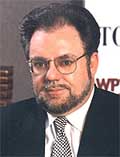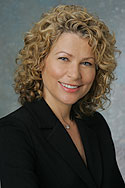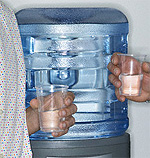Conference calls in full gear just scroll down. Your colleagues have a need to know so send them this RBR
with your note to have them sign up for a Trial RBR.
Trial Subscription Sign Up
|
|
|
|
|
Volume 23, Issue 152, Jim Carnegie, Editor & Publisher
|
Monday Morning August 7th, 2006
|
|
|
Radio News ®
|
 What now for Emmis? What now for Emmis?
Emmis Communications CEO Jeff Smulyan announced after the market closed Friday that he had dropped his effort to buy out other shareholders and take the company private (8/4/06 RBR/TVBR Bulletin). So, what happens now? The first reaction appears to be a stock price drop for Emmis shareholders. After closing Friday at 14.52 before the Smulyan announcement, Emmis shares dropped below 12 bucks in after-hours trading. As other broadcasting stocks had continued to fall, Emmis had gotten some price support from the 15.25 offer that was on the table - but no more. In fact, the soft market for broadcast stocks was cited in Smulyan's letter to the board and public announcement as a factor in his decision to withdraw the offer. Nonetheless, he said in his announcement that he still believes in the business. "I continue to believe in the long-term prospects of Emmis. I look forward to continuing to work with our phenomenal group of employees to build value in the Company's portfolio," Smulyan said in his announcement.
| Read the official letter withdrawing the buyout offer |
RBR observation: From the beginning there was shareholder discontent with the Smulyan offer. Lawsuits were filed claiming it was an attempt to buy the company on the cheap and considerable pressure was put on Emmis' outside directors to negotiate a higher price. After all, just a few months earlier the company had bought back a big block of its stock for 19.50 a share. But market conditions had deteriorated for radio and TV stocks, so the Smulyan offer was, at the time, a 13.6% premium over the market price. Things have only gotten worse since then. So, the offer is off the table and Emmis' stock will no doubt take a sizeable hit today. Then, it's back to business. Smulyan still has the overwhelming majority of his personal fortune wrapped up in Emmis, so he has strong incentives to work hard on getting the company through this tough market and, hopefully, some day see its stock price rise as radio stocks come back into favor. Meanwhile, he still has a couple of TV stations to sell - KGMB-TV (Ch. 9, CBS) in Honolulu, WVUE-TV (Ch. 8, Fox) in New Orleans - after which Emmis will truly be again a pure-play radio company, plus the relatively small regional magazine division.
 Advertisers launch Advertisers launch
eBay experiment
RBR first reported in May that an advertising industry taskforce was working on a pilot program to test online buying and selling of advertising - and we reported hints that it would involve eBay (5/11/06 RBR #93). Sure enough, the task force announced Friday that it has launched a website for interested participants to sign up - admarketpilot.com - and is working with eBay to develop and manage the framework. Advertisers already committed to participate include Wal-Mart (whose Julie Roehm was an early advocate of the project), Toyota, Microsoft, Hewlett-Packard and Home Depot. The pilot program to develop and test an e-Media Exchange is backed by both the Association of National Advertisers (ANA) and the American Association of Advertising Agencies (AAAA). "It is the right time to explore the potential benefits of an e-Media Exchange. It's an exciting time to be in our business. We are in a rapidly evolving, increasingly complex media environment with a myriad of content choices and distribution channels. To be effective in the future our processes must embrace the advancements in technology and the benefits of our digital world," said task force participant Ann Bybee, corporate manager, Lexus Advertising, Brand and Product Strategy. Participants already signed up weren't named, but are said to include several leading advertisers in the automotive, consumer goods, retail and technology sectors. The pilot will test the viability of securing inventory and matching it with the marketers' requirements in an electronic marketplace. The marketplace will protect participants' need for confidentiality as appropriate and participation in the marketplace is on an opt-in basis, the task force said. A variety of media are under consideration for the test, but it appears certain that TV will have a prominent role. "The pilot will be an adjunct to the existing media buying system, not a replacement for the Upfront market," the task force emphasized.
RBR observation: There are certainly Internet-based advertising buying and selling sites already in operation for various media. What is different about this one is who is running it - the advertisers and agencies, who obviously will be seeking a system designed to do business the way they want to do business. That's not necessarily a bad thing for broadcasters, but they should want to offer some input on how the platform should function as viewed from the other side.
Publisher note: Just a few agency people have a way of running head first to get what they want before thinking with which they have to do business with to get their ad and brands across. The broadcaster. Over the last few weeks I have been fielding a number of questions on internet-based buying services being asked the difference and my only answer today is when I hear Google I only think Search Engine. Now with eBay I think Bidding on someone's used goods. On any internet service my recommendation to our colleagues is to do your own research and you determine who you want to do business with and go a little slow as this is no time to be running into the wall head first.
|
|
|
 Clear Channel looking Clear Channel looking
to raise the ceiling?
Mark Mays has made no secret of the desire of Clear Channel to be able to keep buying radio stations in markets where they've already maxed out a cluster. An article at TheDeal.com says they are working quietly to see if they can't take advantage of the FCC's review-in-progress of media ownership rules, and may kick it up a notch with a formal petition. The desired new ceilings seem to be the same as those suggested earlier this year by Representative Fred Upton (R-MI), taking the eight-station cap up to 10 in many large markets and all the way to 12 in the largest, where there are 75 or more stations. TheDeal.com notes the obvious, that any such proposal is certain to set off a firestorm of protest, given that the current rule review is at least partly a result of the firestorm set off by the 2003 attempt, and radio ceilings didn't even figure into that one. Clear Channel says the higher cluster sizes are needed to compete with new entrants into the audio universe such as 100+channel satellite radio systems, iPods and Internet radio.
RBR observation: FCC Chairman Kevin Martin seems to default to the deregulatory side of most issues. On the other hand, we constantly hear about his astute grasp of inside-the-Beltway politics. He has stated many times that he would like to strike down the ban on newspaper/broadcast cross-ownership, but has said little about broadcast ceilings. Other things to consider are the fact that radio received a huge deregulatory gift back in 1996, going from four- to eight-station ceiling in many large markets and being freed entirely from the national cap. Changes in television caps were largely to blame for the 2003 uproar, but you'd think that medium would still be in line ahead of radio for some deregulatory attention. Even if Martin had not had a front row seat for the failure of Michael Powell's 6/2/03 dereg attempt, the fact that most of it is sitting there on his desk again should be an ample reminder of the risks involved in biting off too much at once. Still, stranger things have happened here in Washington, so we will stay tuned.
 FEC may ease ad regs FEC may ease ad regs
The November elections are less than 100 days away, and it looks like its going to be another banner year for the political category. Nevertheless, at least one Federal Election Commission commissioner is thinking about putting an exemption in place that would unleash even more issue-related cash into the process. The issue goes back to the Bipartisan Campaign Reform Act attributed to John McCain (R-AZ) and Russ Feingold (D-WI) in the Senate and Chris Shays (R-CT) and Marty Meehan (D-MA) in the House. Among other things, it prohibited certain organizations funded by corporations or unions from running political/issue advertising within one month of a primary election or two months of a general election. These groups have complained in court that it deprives them of their right to make their opinions known in issues of particular interest. And they've been shot down in court, since around election time, an issue ad often ends up indirectly supporting or attacking one or another candidate. According to the Associated Press, Commissioner Hans von Spakovsky is going to bring up an exemption giving such groups more leeway to buy radio and television time.
RBR observation: The sponsors of BCRA were highly annoyed with FEC back in 2004 for what they perceived as foot-dragging in enforcing the Act, particularly when it came to 527 organizations. We imagine that reaction would be doubled when it comes to this seeming effort to overturn portions of BCRA which have already been supported in the courts (although McCain did not sign on to a recent BCRA update proposal from the other three). It'll be interesting to see where this one is going.
It pays to avoid delays
Peter Gutmann of law firm Womble Carlyle Sandridge & Rice has some practical advice for clients and broadcasters in general. In a nutshell, the advice is to get your annual regulatory fees in on time, and ahead of time if at all possible. The deadline is 9/19/06. At some point, he says, the FCC will have pertinent information for each station available at fcc.gov/fees/regfees.html, although at the time of his writing it wasn't there yet. He notes in particular that the FCC has a track record of no excuses when enforcing the deadline, and any tardiness at all results in a hefty 25% penalty. There are many options for payment, but things like couriers getting a flat tire or even a lethargic FCC online process due to heavy use by late remitters will not get you out of paying extra. Therefore, getting the money in early is strongly advised. Don't forget to enclose FCC Form 159 and, if needed, 159-C.
|
|
|
|
| Executive Comment |
 Less is More Less is More
It is amusing to listen to industry "Titans" discuss the Less is More idea (8/3/06 RBR #150). Many of us had that discussion more than three decades ago (Yes, there was life before Clear Channel became Tsar). Listeners could care less what we call it, they just know what it sounds like and a commercial is a commercial to them...:30 or :60. If you run 18 or 20 commercials an hour you interrupt their music source 18 or 20 times. At best four clusters accommodating 18 commercials. Effectiveness is lost and, over time, advertisers decide that "Radio doesn't work." The other problem is that Clear Channel has been able to accumulate more than 1200 radio stations and in many markets they have clear dominance by virtue of the number of stations owned. In most of those markets they do not lead when it comes to programming or a rate structure. The industry standard through the years was to price a :30 second ad at 80% of a :60. Clear Channel took that rate to the basement and with it any hope that the industry can meet Wall Street expectations. Clear Channel practiced "Less is More" internally long before they floated the concept throughout the industry. In the face of sagging ratings brought on by inattention to individual markets their salespeople were told to sell "less" for "More." Predictably the advertising community declined their invitation and so the sales force, faced with "More" ultimatums sell it for "Less." In the meantime all stations in the market suffer. Take a look at markets where Clear Channel stations are third or fourth or lower and a competitor clearly leads in programming. You'll see a healthier revenue market. When it comes to programming or sales advice from Clear Channel, "Less" is much better than "More." Somebody had to finally say it.
Tom Joyner
President
Joyner Radio, Inc. |
|
|
|
|
Ad Business Report TM
|
If you're wondering where your clients went...
Thus far, it's been a tough millennium for the advertising business. The initial trouble started with the dot-com implosion on the cusp of the century changeover, and since then, it's been chugging along in fits and starts. For every start, a fit is thrown, usually in the form of additional competition from a new advertising medium bellying up to the table to carve out a piece of the pie, or an old form of advertising trying a new angle. If you're wondering which companies out there are buying ads, a good place to begin your hunt will be at any movie theater showing "Talladega Nights." In a review headline, the New York Times says "The Men Are Rowdy, the Cars are Fast and the Product Placement is Extreme." Professional auto racing is well-known for turning anything it possibly can into a billboard, and Hollywood has become addicted to the cash it can get by casting products in its own cinematic product. The movie merges both tendencies. As NYT puts it, "...the movie is happy to mock the sport's eagerness to sell prime uniform and chassis space to sponsors like Perrier, Wonder Bread and Old Spice. It also is tickled pink at the eating habits of its fast-driving characters, who wash down Domino's Pizza and Kentucky Fried Chicken with Coca-Cola and Budweiser..." It goes on. Perhaps it will constitute a prospect list for your own sales staff.
|
|
|
|
| Management Business Report TM |
 The Art of the Interview: The Art of the Interview:
"Hiring the Best"
By Julie Ballard-Lebe, a 19 year veteran of CBS Television Stations and currently Senior Vice President/Director of Sales managing 7 of their 10 national sales offices.
Hiring 'the best' employees has to be the single most important and most challenging responsibility facing media sales management today. It sets you and your company up for maximum performance in an ever-changing competitive environment. Hiring this special person takes experience, time and lots of listening skills (and the openness to learn from your past mistakes!). Would you believe that 40% of all hires are considered poor hires after the glow of the new, well-polished interviewee wears off and the poor work habits kick in? You can help prevent a hiring mistake by keeping a few key points in mind:
| Read More... |
|
|
|
|
| Media Business Report TM |
 CBS steps up water cooler buzz CBS steps up water cooler buzz
The CBS Television Network has James Woods ready to star in a new prime time legal program called "SHARK," and it is utilizing a new venue to promote the program. It will literally command the space around the water cooler in legal offices by advertising on water coolers provided by AquaCell. Using AquaCell's "Coolertising" program isn't new for CBS, but this effort will be the first time it has branched into the dramatic category. Previously, CBS used the water coolers for comedies only, and thus far only in retail locations. Companies which use the AquaCell service get the water for free, while AquaCell sells billboard style promos on the bottle band and on the cup holder of the five gallon containers. "We're thrilled CBS is expanding its Coolertising program beyond the retail stores by advertising on coolers installed in lawyer's offices," said AquaCell President Karen Laustsen. "Lawyer's offices are the perfect place for CBS Television to promote 'SHARK."
|
|
|
|
| Media Markets & Money TM |
Radio stocks? Fugetaboutit!
Jim Boyle doesn't cover bank certificates of deposit, but he's telling investors that they appear to be a better deal than radio stocks for the second half of 2006. "Radio investors would make more money, or at the least not lose any more money, if they shifted a substantial portion of their radio stock investments into six-month CDs or Treasury bonds rather than staying in or attempting to selectively buy radio stocks. Too many of us have for too long kidded ourselves that the radio sector was, is or is soon to be poised for a marked upturn. Or you were told that logically selective trading should produce profits. I include myself in that wishful group, and for way too long," Boyle said as he issued his radio sector initiation report for his new employer, CL King & Associates. Sure radio stocks have taken a beating over the past 30 months, but Boyle says there is no reason to think that they have hit bottom. "As the trends are weak to disappointing, if not downright depressing - and this from an analyst whose family has been in radio for 50 years and is the only analyst to have worked in radio," Boyle wrote. How much more will radio stocks fall this year? Boyle says the potential downside in the second half of 2006 is 10-15%. The trends are so negative, he says, it is useless to try to pick companies or niches which will outperform the overall radio industry. "Save money, go now," he said in turning a thumbs down on all radio stocks.
Inner City finds a Pearl in Mississippi
Pierre Sutton's Urban Radio II/Inner City Broadcasting is upgrading its Jackson MS superduopoly cluster, adding WJNT-AM Pearl MS to the two AM/three FM cluster it has in the Mississippi state capital. The seller is Buchanan Broadcasting Co. Urban will pay 1.65M for the station, which will join WOAD AM & FM, WKXI AM & FM and WJMI-FM in a balanced three-per-band cluster.
Price revealed in Bloomington buy
The paperwork is in for Connoisseur Media's acquisition in Bloomington IL. It's getting WIHN-FM from AAA Entertainment for 4M. The deal will have the unusual effect of taking Connoisseur up to three FMs, combining the station with WBBE-FM & WVMG-FM and, according to BIAfn, taking AAA down to three FMs, WRPW-FM, WYST-FM & WDQZ-FM. AAA is also active in the nearby Peoria market.
NextMedia out of gas station advertising
Radio/outdoor company NextMedia is getting out of the most unusual part of its outdoor advertising division. It announced a deal Friday to sell its Indoor and Gas Station Pump Top Advertising operation to BriteMedia on undisclosed terms. The gas station pump top advertising portion is self explanatory. The indoor part involved advertising posters placed in public restrooms at bars, restaurants, department stores and such. Definitely a niche category. That should fit well with BriteMedia's existing business, which is selling advertising on sleeves for holding cups of coffee.
|
|
|
|
| Washington Media Business Report TM |
 Democrats hold edge Democrats hold edge
in Senate cash campaign
Historically, Democrats have been the underdog when it comes to filling their campaign coffers compared to their Republican friends across the aisle. But with 18 months of the 2006 election cycle in the books, Democratic senatorial candidates have raked in significantly more money, and have more left to spend. So far, all involved in Senate campaigns have raised 344.89M. The Democrats hold a 190.41M to 154.48M edge, and while they've spent more already, 97.93M to 89.19M, they also have a significantly larger amount left over, 119.33M to 87.06M. Democrats hold the edge in both incumbency defenses, 91.8M to 87.06M, and in challenger attacks, 19.03M to 11.61M. When it comes to open seats, Republicans enjoy the lead, 10.65M to 9.02M. More to come.
|
|
|
|
| Monday Morning Makers & Shakers |
|
Transactions: 6/19/06-6/23/06
Trading on the radio side came within a whisker of matching the value of trading on the television side this week, although it took 45 stations to TV's one, a noncom at that. Cherry Creek's acquisition of small market radio stations out of the Fisher portfolio and a fairly big small market buy by Armada Media almost made up for Trinity's move into Orlando.
|
|
Total
|
|
Total Deals
|
11
|
|
AMs
|
15
|
|
FMs
|
30
|
|
TVs
|
1
|
| Value |
98.903M
|
| Complete Charts |
|
Radio Transactions of the Week
Fisher sends stations up the Creek
| More... |
|
TV Transactions of the Week
Orlando TV onto Crouch couch
| More... |
|
|
|
|
|
| Transactions |
180K WMSK-AM Morganfield KY from Union County Broadcasting Co. Inc. (J.B. Crawley) to Henson Media Inc. (Edward Henson). 10K esxrow, addition 135K for assets, 35K for license, LMA until closing, 300/month credited toward purchase price. Combo with WEZG-FM Sturgis KY. Seller retains WMSK-FM, but will swap those calls to buyer in exchange for the WEZG calls. [File date 7/14/06.]
80K WJCP-FM CP Jackson MI and WAQQ-FM CP Onsted MI from Great Lakes Community Broadcasting Inc. (James J. McCluskey) to Edgewater Broadcasting (Clark Parrish, Diana S. Atkin, Earl Williamson, Dennis Clounch, Gary Phelps). 20K deposit, balance in cash at closing. WJCQ-FM is Class A on 89.7 mHz with 500 w @ 121'; WAQQ-FM is Class A on 88.3 mHz with 250 w @ 75'. [File date 7/14/06.]
|
|
|
|
| Stock Talk |
Radio stocks beat a down market
You won't see us reporting this very often, but Friday was one of those rare days when radio stocks were up while the broader market was down (barely). The Dow Industrials fell 2.2 points to 11,240 as the government reported slow job growth, but traders were unwilling to bet that the Fed will stop its rate hikes.
Meanwhile, the Radio Index rose 0.561, or 0.4%, to 139.746. A lot of that was attributable to Saga, whose stock has been beaten up of late. It rebounded 9.7% on Friday. Entercom rose 3.2% after reporting a well-priced stations sale with its Q2 report a day earlier.
|
|
|
|
| Radio Stocks |
Here's how stocks fared on Friday
| Company |
Symbol |
Close |
Change |
Company |
Symbol |
Close |
Change |
|
Arbitron
|
ARB
|
|
36.38
|
+0.01
|
Hearst-Argyle
|
HTV
|
|
21.01
|
unch
|
|
Beasley
|
BBGI
|
|
6.50
|
-0.10
|
Journal Comm.
|
JRN
|
|
10.54
|
+0.07
|
| CBS CI. B |
CBS |
 |
25.80
|
-0.56
|
Lincoln Natl.
|
LNC
|
 |
56.68
|
-0.21
|
| CBS CI. A |
CBSa |
 |
26.35
|
-0.02
|
Radio One, Cl. A
|
ROIA
|
 |
6.97
|
+0.07
|
| Citadel |
CDL |
|
8.76 |
-0.29 |
Radio One, Cl. D
|
ROIAK
|
|
7.02
|
+0.08
|
|
Clear Channel
|
CCU
|
|
28.95
|
-0.01
|
Regent
|
RGCI
|
|
4.08
|
unch
|
|
Cox Radio
|
CXR
|
|
14.97
|
-0.21
|
Saga Commun.
|
SGA
|
|
7.90
|
+0.70
|
|
Cumulus
|
CMLS
|
|
9.40
|
unch
|
Salem Comm.
|
SALM
|
|
12.29
|
+0.20
|
|
Disney
|
DIS
|
|
29.90
|
-0.14
|
Sirius Sat. Radio
|
SIRI
|
|
3.94
|
-0.02
|
|
Emmis
|
EMMS
|
|
14.52
|
-0.16
|
Spanish Bcg.
|
SBSA
|
|
4.60
|
-0.03
|
| Entercom |
ETM
|
|
23.26
|
+0.73
|
Univision
|
UVN
|
|
33.46
|
-0.01
|
|
Entravision
|
EVC
|
|
7.48
|
-0.14
|
Westwood One
|
WON
|
|
6.62
|
-0.02
|
|
Fisher
|
FSCI
|
|
39.37
|
-0.91
|
XM Sat. Radio
|
XMSR
|
|
12.02
|
+0.21
|
|
Gaylord
|
GET
|
|
39.21
|
+0.35
|
-
|
-
|
-
|
-
|
-
|
|
|
|
|
|
|
Bounceback
|
 We want to We want to
hear from you.
This is your column, so send your comments and
a photo to [email protected]
|
|

|
Below the Fold
|
|
Executive Comment
Amusing to listen to industry
"Titans" discuss the Less is More...
Management Business Report
The Art of the Interview
"Hiring the Best"...
Media Business Report
Water cooler buzz
At CBS is heating up...
Ad Business Report
Wondering where your clients went
It has been a tough millennium for the ad biz...
Media Markets & Money
Radio stocks? Na
CD's appear to be a better deal...
Washington Media Business Report
Democrats hold edge
In Senate cash campaign...
|
|
|
Stations for Sale
|
CD Border 25kw FM
Profitable competitive op.
Small/dual market FM with huge upside for turnaround operator.
595K 781-848-4201 or [email protected]
|
|
|
More News Headlines
|
Battle Line ending
daily syndication
Radio America announced that Monday, September 4th, will mark the final daily broadcast of "Battle Line" with Alan Nathan, although the weekend edition will continue to air on Saturdays. For the remainder of September the network will fill the 3-6 pm ET Monday-Friday slot with the Nashville-based talk show hosted by Steve Gill, with an announcement to be made later about a permanent replacement show.
|
|


|
RBR Radar 2006
|
|
Radio News you won't read any where else. RBR--First, Accurate, and Independently Owned.
|
Executive comment
In regards to... Robert Neil and David Field - Less really IS more, and that's a problem.
I'm so sick of reading fabricated, hucksteristic crap about commercial clutter on radio! "Clutter on radio" is nothing more than a public company windmill to tiff at for the prurient benefit of light-weight Wall Street investors, and to a lesser extent media queens, who can not see through the flimsy smoke screen. Savvy investors and media buyers know the charge that radio needs to cut commercial clutter is unadulterated baloney. Radio is about QUALITY, including quality of commercials. It is not about HOW MANY commercials. ... Yes there is more see
08/04/06 RBR #151
Google selling satellite radio ads
Google is moving ahead with its plans to become a middle man for ad sales across the full spectrum of media. Google-owned dMarc already connects buyers and sellers of spots on terrestrial radio and now it is moving into satellite radio. XM announced a deal to have dMarc sell commercial inventory on its non-music channels.
RBR observation: From the time it bought dMarc early this year Google has made it clear that terrestrial radio was just the beginning. It paid 102 million for dMarc, but the payoff for management and former investors could grow beyond one billion if certain targets are met. dMarc has been working to make its system compatible with software from vendors besides its own Scott Studios. Television is also on the drawing board. In other words, Google doesn't want to be seen as just a giant player in Internet advertising - it wants to be a one-stop shopping center for advertisers to buy all types of media. Some people in radio, TV and print may see that as a threat, giving Google too much clout, but others hope it just means that buying and selling advertising becomes simpler and grows the pie for everyone. RBR last word of caution is to go slow and do your own research on all the companies getting into this inventory business. We will have more on this issue of Google but for now RBR would like your comments along with a photo, email to [email protected]
08/03/06 RBR #150
Less really IS more,
and that's a problem
Cox Radio President/CEO Robert Neil likes the idea of less-is-more (LIM), but not the way he sees it going down right now. His personal gripe is the new emphasis on shorter spots that has gone hand in hand with LIM, which he says has actually led to more commercials than when most of them were 60 seconds, increasing the perception of clutter and driving down pricing. Neil believes the industry standard should be 10 minutes of advertising per hour, with 10 minutes = ten spots. He called it a simplistic solution, but no more simple than supply and demand. Entercom CEO David Field disagreed with Neil's claim that :30s are bad. "It's a better way to conduct our business because we will be able to create a far greater yield for each second, if you will, than we can in a 60-second environment. To deliver a message in 30 seconds, or 15 or 10 is just far more efficient than doing so in 60 seconds. There is no reason in this day and age why that is necessary," Field said.
RBR observation: We just read Cox's Bob Neil's take on spot length compared to Entercom's David Field. With respect to both executives, you can first spot that Neil is the programmer of the two and Neil's simplistic solution it just may be wise to keep it simple. RBR has to agree on this debate with Bob Neil except make it 9 minutes instead of 10. Clutter is something radio needs much less of and get back to being local and entertaining if you are going to compete for today's listeners with all kinds of devices. And if the radio business can not decide on a simplistic solution how is HD going to make any difference? Radio right today just has too many bean counters in control.
08/03/06 RBR #150
New analyst sees troubles for radio
Morgan Stanley analyst Benjamin Swinburne has initiated coverage of five radio stocks, but worries that radio is losing listeners and advertising share, so historically low stock prices are not bargains for investors. They also believe radio will continue to lose advertising share to Internet, TV and Outdoor and that Internet (classified and paid search) in particular represents a major threat. We also believe greater programming investment is needed to stem usage declines. His only overweight (buy) recommendation is for Cox Radio, based on the possibility of Cox Enterprises taking it private. Otherwise, he sees no reason for investors to buy the stocks. He ranks Radio One at equal-weight (hold) "due to its low relative valuation." Swinburne gave underweight (sell) ratings to the other three - Clear Channel, Entercom and Cumulus.
Publisher observation: This is one of the very few analyst reports that have called it on the money. Greater need for investment in programming, agree. But RBR highly recommends to all analysts to look at the day to day upper management and their level of performance. Some are better at sending out pink slips to hit their margins. Investments needed? You bet but in people with experience. Judge from the top down and Check out the CEO's resume to see if each has the knowledge, experience needed to run and manage these radio operations. You will be surprised.
08/02/06 RBR #149
|
|
|
|
 |
General Manager
Saga Communications, a top of the line radio and media company really has a rare opening at Rock 102 and Lazer 99.3. Saga carefully reviews all GM applicants but this opportunity necessitates being extra picky. Considering only GM's with a documented reputation for effective leadership and management to oversee these facilities that are accustomed to high standards at all levels. Excellent facilities, benefits and quality of living in Springfield, MA. Saga a top of the line company committed to excellence in media today. EOE.
See Radio Careers
Director of Sales
Needed for radio cluster in Mid-Atlantic region. 5 years plus experience as DOS a must, with successful track record. Must be able to develop sales talent into a winning team. Excellent benefits & compensation plan.
See Radio Careers
Hard finding that key person
to fill the important position at your organization? RBR's - Media HeadHunters is the place that key media firms use to get results. See www.mediaheadhunters.com and get results with service--Period.
|
 |
|
|
|
|
Help Desk
|
__FIRST__ __SECOND__ :
Having problems with our epapers?
Please send Questions/Concerns to:
[email protected]
If you wish to remove your name completely from our database use this link __UNSUB__
RBR Epaper --  108 annual 108 annual
or just  9 a month 9 a month
|
|
|
|
©2006 Radio Business Report, Inc. All rights reserved.
Radio Business Report -- 2050 Old Bridge Road, Suite B-01, Lake Ridge, VA 22192 -- Phone: 703-492-8191
|
|